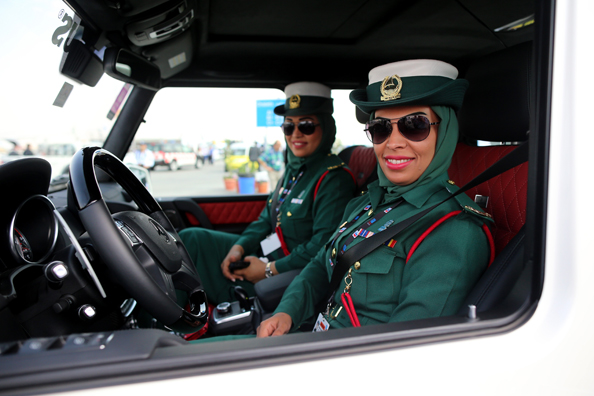“People often treat ‘feminism’ like a dirty word. To me, the notion of feminism is simple – it’s about making positive choices and taking action every single day. It’s about equal representation,” says Radhika Punshi about the changing roles of women in modern society.
“I am a first time mum to a beautiful 10-month-old baby girl, and both my husband and I have very demanding careers, and we need to find the right balance between us. Gone are the days when husbands’ careers took precedence over that of their wives. If I need to travel for work, it means that my husband needs to work from home to be with Ayana – that’s feminism to me.
“I honestly find it very surprising that we still need to talk about equal opportunities and equal representation in the 21st century. It really is not an option anymore. Women’s progress cannot be separated from the development of the societies they have built and share with men.
The book Game Changers: How Women In The Arab World Are Changing The Rules And Shaping The Future [which she co-wrote] was born as the result of the conversations that [co-writer] Sophie Le Ray, David B. Jones and I have been having since 2012 about the emergence of women in the Arab world, the amazing opportunities that exist and also the very real challenges we still need to overcome.
“There are also very prevalent stereotypes that the Western world has about our region, and their image of a disempowered, powerless Arab woman. We wrote the book hoping to overturn some of these misconceptions and perceptions.
Read: The Truth About Middle East Stereotypes
Read: Will Smith Talks About Islamophobia And ‘Cleansing’ Donald Trump
Read: 8 Celebrities You Didn’t Know Were Muslim
“In our work with the Women in Leadership (WIL) Economic Forum, David, Sophie and I have also come across some incredible stories of women and men champions of change from our region – and their stories add a powerful narrative to the book. For example, we interviewed Raha Moharrak, the first Saudi female to climb Mount Everest, about her life journey. This book is also about bringing forward powerful data and evidence that can inform what governments, employers, educators and all of us can do to support gender diversity and inclusion in our world.
“The status of women in our region is changing at a nearly unprecedented scale and pace. For instance, girls here outperform boys in terms of academic achievement in all subjects including the STEM (science, technology, engineering and mathematics) subjects, whereas in the rest of the world, the boys still do better in STEM. On average, women represent 26 per cent of the GCC labour force, merely half of the global average of 52 per cent.

In the UAE women are are taking a stronger role in what’s considered men’s jobs
“However, though coming off a low base, the rate of female labour force participation is accelerating rapidly. And as we reach critical mass where women participate more actively in our workplaces and societies, this single factor will have the largest impact on the evolution and transformation of our societies.
“What really stands out to me as an HR professional and organisational psychologist is the paradox of how and why, despite making significant strides in educational attainment, women are losing out in the workplace. The numbers halve at every critical transition point – for example 60 per cent of all graduates are women, but only 26 per cent are currently active in the formal labour market and only 15 per cent or so make it to mid-level, supervisory positions.
Read: Best And Worst Schools In Dubai
Read: Why Kerry Washington Is Team Hillary
Read: Muslim Women Join Forces Against Donald Trump
“And it starts to get very lonely at the top, with female representation in leadership positions and company boards in the low single digits, five to seven per cent. In contrast, men in general have easier access to high-paying, high-status employment although they often achieve substandard educational outcomes compared to their female counterparts.
“We need to do much more to develop and retain women at work, especially working mothers, so that they can achieve a smoother balance between managing their families and their careers. A few companies are making massive strides in this arena. For example, we’ve worked very closely with Roche Diagnostics Middle East to bring Game Changers to life, and we’ve seen first-hand the impact that multinationals can have in supporting women’s economic empowerment in the region.
“The public sphere obviously also has a great impact. And there is certainly much greater awareness and urgency these days among GCC governments to support greater gender representation. Last year, H.H Sheikh Mohammed announced that all boards need to have a female director, and this year, there are eight women in the UAE cabinet.
“However, changing the game means changing the rules, and there is still plenty to be done from a regulatory perspective. This includes the need for longer maternity leave, introduction of paternity leave, provision of day care facilities, clarification and improvement in the legal status of part-time, flexi-time and work-from-home arrangements.
“There is a growing awareness among employers that increasing the representation of women is not only the ‘right’ thing to do, but also the ’smart’ thing to do. And they are becoming aware that they need to invest in inclusion efforts – our workplaces may be diverse, but they’re not always inclusive.
“Regional employers also need to take deliberate steps to attract, engage and retain more women across the hierarchy, especially in managerial and leadership positions. This needs to be integrated into organisational strategy – it is not something that will happen on its own. True change will only happen as a result of conscious, collective effort.”
Words: Radhika Punshi co-author of Game Changers: How Women in the Arab World Are Changing the Rules and Shaping the Future












